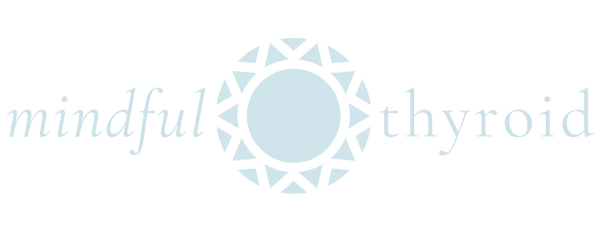

What Is Hashimoto's?
Are you newly diagnosed with Hashimoto's Autoimmune Thyroid or want to understand it better? In this article, I break it all down in an easy to understand way, answering some of the most frequently asked questions.
Hashimoto’s is an autoimmune thyroid disorder where the immune system makes antibodies that attack the thyroid peroxidase (TPO) enzyme. This enzyme is needed to attach iodine to a tyrosine amino acid in order to produce thyroxine (T4) thyroid hormone. The autoimmune attack leads to inflammation, an enlarged thyroid (goiter) and reduced T4 hormone that causes hypothyroidism to occur (1).
Over time, the thyroid gland will become more inflamed and produce even less thyroid hormone which reduces the energy needed for the body’s systems to function efficiently. That process results in hypothyroid symptoms, such as, fatigue, weight gain, feeling cold, brain fog, low energy, depression/anxiety, panic attacks, hair loss, dry skin, joint pains, constipation and digestive issues. You may also experience inflammation, swelling and possibly nodules in the neck or thyroid area due to inflammation from the autoimmune attack.
How Is Hashimoto's Diagnosed?
Testing for TPO antibodies can diagnose Hashimoto’s – a level over 35 indicates autoimmunity. In the earlier stages of Hashimoto’s, it’s common to swing from hyperthyroid symptoms to hypothyroid symptoms until you eventually just feel tired and sluggish all the time and become hypothyroid; you may still show in normal range on a TSH test (2). This means you might swing from periods of high energy, weight loss, anxiety/panic attacks or palpitations to periods of fatigue, weight gain, depression and constipation that can last several months at a time.
Not Just A Thyroid Issue
Your adrenals, blood sugar, sex hormones and gut health are involved. Autoimmunity occurs when three factors are present (3):
- Poor gut health (dysbiosis and leaky gut)
- Genetic predisposition
- Triggering factor(s) like stress, viruses, nutrient deficiencies and toxin overload
The thyroid hormones control the rate of metabolism in the body which affects energy output and cell replication. Every organ system is directly or indirectly influenced by thyroid hormones. Hypothyroidism can contribute to lower stomach acid, slowed peristalsis and migrating motor complex activity in the small intestines, which cleanses and sweeps intestines to remove bacteria and remaining food into the colon. This also leads to slowed transit time and evacuation of stool in the large intestines and causes water, bile and consequently cholesterol and toxins to reabsorb back to the liver for processing again (4).
This overall slowed metabolic and digestive process contributes to a high toxin load, high cholesterol, water retention, bloating, fatigue, low energy and digestive dysfunction common in hypothyroidism and Hashimoto's disease.
What Lab Tests Do I Need?
Ask your doctor for a full thyroid panel, not just the TSH (thyroid stimulating hormone) test. At the very least request TSH, Free T4, Free T3 and TPO antibodies every time you test to keep consistent data for tracking your levels and medication dosages.
Free T4 hormone is unbound in the blood making it available for the body to use to convert to T3, the active thyroid hormone. Free T3 is the active thyroid hormone that’s unbound and available for uptake by the cells. TPO antibodies greater than 35 (on most lab ranges) are indicative of Hashimoto’s autoimmunity (2). The TPO antibodies test can also be used as a guide to see if your lifestyle & diet changes are reducing the autoimmune attack on the thyroid.

If you want to test at home, I recommend using Paloma Health Thyroid Test Kit. Click the link for a $30 discount off your first test!
Why Do I Feel Hypothyroid When Lab Tests Are Normal?
Most doctors will primarily test for TSH, which is the hormone from the Pituitary gland that tells the thyroid to create T4 thyroid hormone. It doesn’t tell you how much thyroid hormone is circulating in your body and if you’re even able to get it into your cells for use. Always ask for a full thyroid panel to get more detailed data. You can be hypothyroid even if the TSH test shows in range if you’re not absorbing or getting thyroid hormone in the cells.
Factors that contribute to thyroid hormone not getting converted properly to T3 and/or used by the cells include (1,3):
- Blood sugar imbalances
- Poor diet
- High cortisol levels
- Birth control pills
- Infections and immune stress
- Nutrient deficiencies
- Candida overgrowth
- SIBO and other gut bacteria imbalances
Additionally, there are many other diseases, nutrient deficiencies and gut imbalances that are very similar to thyroid imbalances and may be affecting you, rather than thyroid levels. Testing for the full thyroid panel can help rule that out if it’s all normal so that you can look at other underlying issues that may be occurring. You may have to work with a Functional Medicine Doctor or Naturopathic Doctor to obtain further testing and uncover root cause issues.
Can I Put Hashimoto's In Remission?
You can reduce and even eliminate symptoms of Hashimoto’s and reduce your TPO antibodies level through nutrition, lifestyle and medication (if needed). Remission is a bit misleading of a term because your body will always have the antibodies it created towards the thyroid and you can't reverse that factor (2). However, you can reduce the antibodies and level of inflammatory attack. I like to think of it as "well managed" Hashimoto's.

Incorporating lifestyle interventions, getting enough nutrition and bringing your body back into balance will help you effectively manage the Hashimoto’s disease so that you don’t have symptoms anymore. However, you still have the genetic predisposition for it and the antibodies (even if not active) that your immune system has designated towards the thyroid. If you were to go back to a lifestyle that increases inflammation and/or have certain viruses or other triggering immune issues occur in the future, you can see antibody levels go up, even if not as much as before.
I’d much rather have clients focus on creating a balanced lifestyle that helps you feel great, reduces symptoms and allows you to build sustainable lifestyle choices. You might very well get within a normal TPOAb range, or you might still be out of range, but feel amazing! Use the TPO antibodies lab test as a helpful guide to make sure nutrition and lifestyle choices are getting you in the right direction. Pay attention to how you feel and if the changes you’re making are sustainable for you long term.
What Medications Are Available?
The American Association of Clinical Endocrinologists recommends two different treatment options. There are synthetic (lab created) and natural dessicated (from porcine) thyroid hormone medications. Most synthetic hormones only contain T4 and not T3. However, you can take a synthetic T4 and a separate synthetic T3 if needed. Natural dessicated thyroid (NDT) hormones contain T4 and T3 in combination so some people may feel better on them than with T4 alone. However, NDT hormones can be too similar to our own thyroid hormone and can still cause an autoimmune attack by the body making some people feel worse on them. You’ll need to experiment and work with your thyroid doctor to find a medication that you tolerate well (2).
It’s not an easy transition from synthetic to NDT or vice versa as the dosages are not the same. So it's best to pick one and stick with it unless you're really not feeling well on that type of medication. If you’re going from synthetic to NDT you’ll most likely start at a lower dose and need to work your way up as it will potentially feel more effective with the addition of T3 (2). This may cause some unpleasant symptoms during transition until you find your optimal dosage.
Lab tests should be done every 8-10 weeks when starting a new dosage or making dosage changes. It can take that long for the body to register the change and to have an accurate view of how your body is responding to the medication. After that, you'll test every 6 months or at least once per year if your symptoms are managed (2).
No matter which one you choose, always opt for the brand name instead of a generic counterpart to get a more effective and consistent dosage. I also recommend using a weekly pill case to put your pills in so you can visually see whether you took them or not.
Feel Energized And Radiant
Medication isn't always needed, especially if you are diagnosed early enough before too much thyroid destruction has occurred and you make lifestyle interventions. By bringing the body back into balance with an anti-inflammatory, nutrient dense diet, exercise, mindfulness and stress reduction, you can lower the autoimmune attack, reduce symptoms and some people may be able to reduce or avoid medication. Each person’s experience is unique and medication can be helpful, while also making lifestyle changes.
You are in control of how you want to feel. I offer several guides and meal plans to empower women with Hashimoto's so that you have the knowledge and practical tips to improve your health today.

Start Your Healing Journey
References
- Rayman MP. Multiple nutritional factors and thyroid disease, with particular reference to autoimmune thyroid disease. Proc Nutr Soc. 2019 Feb;78(1):34-44. doi: 10.1017/S0029665118001192.
- Garber JR, Cobin RH, Gharib H, et al. Clinical practice guidelines for hypothyroidism in adults. Endocr Pract. 2012;18(6):988 -1028. doi: 10.4158/EP12280.GL
- Knezevic J, Starchl C, Tmava Berisha A, Amrein K. Thyroid-gut-axis: how does the microbiota influence thyroid function? Nutrients. 2020 Jun 12;12(6):1769. doi: 10.3390/nu12061769.
- Murray M, Pizzorno J. The Encyclopedia of Natural Medicine. 3rd ed. Atria Books; 2012.




